Looking at the Chromebook and tablet markets in 2025
I'm not feeling quite as excited about what's around the corner.
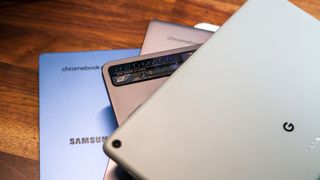
When I wrote a similar piece to this one last year, there was a bit more excitement in the air. Google had just introduced its Chromebook Plus moniker, which has seemingly proven to be a success. But as I reflect on the months past, that sense of excitement has turned into a bit of unease.
I have a similar feeling when it comes to Android tablets but to a lesser extent. With a few exceptions, not really much has changed when looking at the overall landscape. Samsung is still at the top but has seemingly shifted its focus to more budget-friendly solutions. Meanwhile, other tablets were released that are trying to make a dent in an increasingly stagnant market.
None of this is to say that there's nothing to be excited about, but seeing how everything played out, my expectations have definitely shifted. Even still, there are a few things that I would love to see out of both Chromebooks and tablets as we get ready to kick off the new year.
More storage please
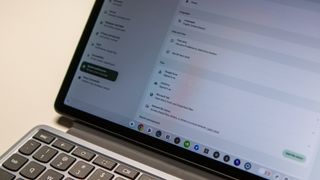
The logical part of my brain understands that not very many people actually care about having different storage options in Chromebooks. Most of the time, you'll be using this while connected to the internet anyway, so you can just rely on Google Drive or another cloud storage solution to store files.
But when I look at a device like the Samsung Galaxy Chromebook Plus and see that it only has 128GB of non-upgradeable storage, I'm a bit disappointed. Samsung tries to offset storage concerns by including a microSD card slot, but this isn't the case with every Chromebook.
Frankly, it's just disappointing to see, and it's something that I hope is rectified in some capacity. At this rate, I'd just be happy to see a new Framework Laptop Chromebook, which gives me all of the flexibility I could want in a Chromebook.
Flagship ARM chips
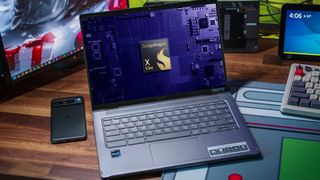
As soon as I heard about Qualcomm's Snapdragon X series of chips, I immediately thought about how great it would be for Chromebooks. For one, there are a few different processors within the series designed to hit various budgets and price points. At the same time, offering a balance of performance and battery life that we still long for with Chromebooks.
Be an expert in 5 minutes
Get the latest news from Android Central, your trusted companion in the world of Android
Needless to say, I was a bit disappointed not to see a single Snapdragon X-powered Chromebook announced before the end of the year. I was hoping that we would have at least seen one, even if it was just a teaser ahead of CES 2025. Unfortunately, that hasn't come to fruition, and I've all but given up on the idea of a Chromebook powered by Google's Tensor chip.
Smaller flagship tablets
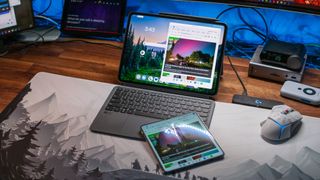
Even if I didn't write about tablets as part of my job, I'd still use them all of the time. It's part of why foldable phones are so important to me since they're basically mini tablets that can be folded in half and stuck in a pocket. Gone are the days of needing JNCO jeans whenever you're heading out and want to bring a tablet with you.
So when I say that I hope to see more "smaller" flagship tablets, I'm not even talking about the OnePlus Pad 2 or RedMagic Nova. I mean even smaller, something around the size of the Nexus 7, if not a little bit larger. OnePlus and RedMagic are filling the void left by Samsung's decision to forgo the 11-inch Galaxy Tab S10. Outside of that, if you want a compact flagship tablet, your best bet is to import something like the Lenovo Legion Y700.
Imagine having a tablet that you can comfortably hold in one hand and use for everything and anything. Yes, Amazon's Fire Tablets still exist, but those are cheap and lack the performance that I'm looking for. What I'd really love to see is Google release a modern version of the Nexus 7, but we all know that won't happen.
Google should change its mind
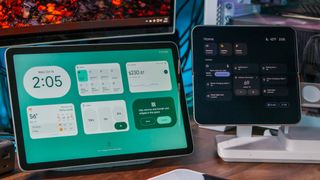
I guess it's only right for me to finish this piece by pleading with Google again. I feel like it's turning into a bit of a habit, as I've pleaded and begged for Google to reverse rumored decisions, only for them to fall on deaf ears. But I digress.
The first thing that I want Google to change its mind about is exiting the tablet market. Of course, these are just rumors, and nothing has been confirmed, but all of the signs point to the Pixel Tablet being a "one-and-done" device. And frankly, that's just downright disappointing.
Even in its current state, the Pixel Tablet is pretty great as long as you understand the limitations up front. For me, the Tablet and Charging Dock have been a staple on my desk, giving me the best smart home controller that I've ever used. No, I'm not here to make that argument again.
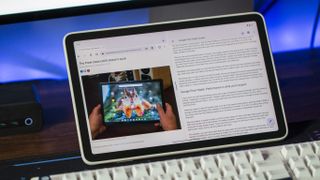
All I'm saying is that I want to see Google stick with the tablet, at least for another iteration or two. How can a company expect sales to be great when it takes an odd approach to the release? Everything was (mostly) fine when you could only get the Pixel Tablet with the Charging Speaker Dock. But then, Google changed course and made it so you could buy the Pixel Tablet by itself. Oh, and that happened a year after the original release.
It also doesn't help that the Pixel Tablet uses an LCD panel with a 60Hz refresh rate and a processor that can't take full advantage of the new Gemini features that Google is so focused on. If anything, there's an opportunity to give the Pixel Tablet a "glow-up" in the same way that we saw going from the Pixel Fold to the Pixel 9 Pro Fold.
What about the supposed Pixel Laptop?
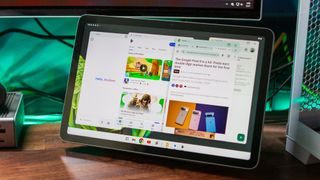
There's one looming question surrounding both Chromebooks and tablets, and that's whether Google is actually planning to release a laptop powered by Android. I'm not smart enough to know how this would affect the market, but it would definitely come as quite a shock.
While some may believe that Google is looking to replace ChromeOS with Android, I'm of the mindset that such a move would be a bad idea. There's too much money involved with Chromebooks and the education segment that I don't think Google would want to jeopardize that.
That being said, I am curious about how a potential Pixel Laptop would be presented if it actually sees a release. If I'm putting on my tinfoil hat, this could be the reason why Google is rumored to have canned future Pixel Tablets. However, I don't believe that a traditional laptop powered by Android would be logical.
Although I feel as though the initial rumors were just seeded so Google could flush out some bad apples, my brain keeps telling me that it's possible. Again, not the whole Android replacing ChromeOS, but the idea of a potential Android laptop.
I'm still not even convinced that this is a "where there's smoke, there's fire" situation. But Google is working towards something different, as evidenced by continued improvements being made to the native Desktop Mode, along with the surprising addition of a Linux terminal app with Android 15 QPR2 Beta 2.
Are we in store for a major shake up in 2025?
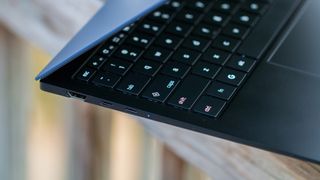
Oh, how great it would be to look into a crystal ball and see what things will look like this time next year. Actually, that would kind of suck, at least depending on how things shake out.
Besides that, I'm really not expecting many drastic or earth-shattering changes to come to either Chromebooks or Android tablets. Even if the rumors the Pixel Laptop are true, I suspect that it won't see the light of day until sometime in 2026. This gives Google plenty of time to improve Android's native Desktop Mode, and implement any other features it might want to include.
Instead, we'll probably see the same companies release incremental "upgrades" while Google continues to find new ways to entice everyone to use Gemini. We expect to see the "Quick Insert" key make its way onto more Chromebooks, making it so you don't have to manually remap a key, or try to remember the keyboard combination.
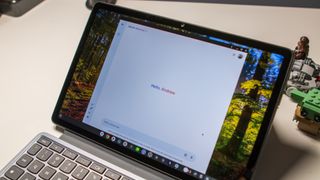
At the same time, I wouldn't be surprised if we started to see Google introduce a dedicated Gemini key for both Chromebooks and tablets. Many of the latest Windows laptops are equipped with a Copilot key, and I suspect Google will follow suit.
Gemini is continuing to improve, as evidenced by the swath of updates Google rolled out at the end of 2024. But if Google wants to keep up with ChatGPT and Microsoft Copilot, it needs more ways to get people using Gemini. The addition of a dedicated key would go a long way in trying to do just that, even if it might end up as a controversial decision.
Who knows — I've been wrong before, and I hope I'm wrong again.

Andrew Myrick is a Senior Editor at Android Central. He enjoys everything to do with technology, including tablets, smartphones, and everything in between. Perhaps his favorite past-time is collecting different headphones, even if they all end up in the same drawer.